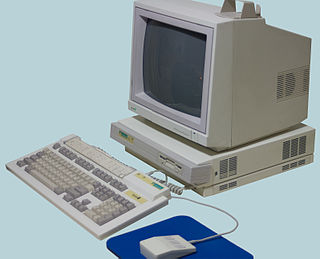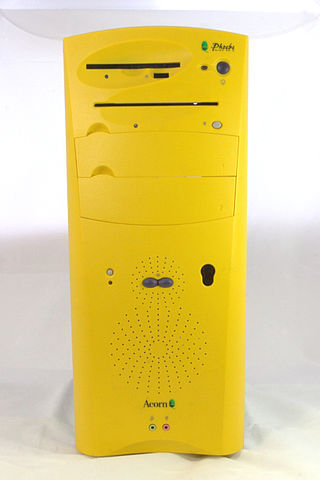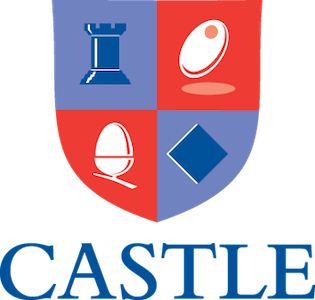
ISO 9660 is a file system for optical disc media. The file system is an international standard available from the International Organization for Standardization (ISO). Since the specification is available for anybody to purchase, implementations have been written for many operating systems.
BBC BASIC is an interpreted version of the BASIC programming language. It was developed by Acorn Computers Ltd when they were selected by the BBC to supply the computer for their BBC Literacy Project in 1981.

Risc PC was a range of personal computers launched in 1994 by Acorn and replaced the preceding Archimedes series. The machines had a unique architecture unrelated to IBM PC clones and were notable for using the Acorn developed ARM CPU which is now widely used in mobile devices.

Acorn Archimedes is a family of personal computers designed by Acorn Computers of Cambridge, England. The systems are based on Acorn's own ARM architecture processors and the proprietary operating systems Arthur and RISC OS. The first models were introduced in 1987, and systems in the Archimedes family were sold until the mid-1990s.

RISC OS is a computer operating system originally designed by Acorn Computers Ltd in Cambridge, England. First released in 1987, it was designed to run on the ARM chipset, which Acorn had designed concurrently for use in its new line of Archimedes personal computers. RISC OS takes its name from the reduced instruction set computer (RISC) architecture it supports.

The Phoebe 2100 was to be Acorn Computers' successor to the RiscPC, slated for release in late 1998. However, in September 1998, Acorn cancelled the project as part of a restructuring of the company.
ARX was an unreleased Mach-like operating system written in Modula-2+ developed by Acorn Computers Ltd in the Acorn Research Centre (ARC) United Kingdom (UK) and later by Olivetti - which purchased Acorn - for Acorn's new Archimedes personal computers based on the ARM architecture reduced instruction set computer (RISC) central processing unit (CPUs).
Timeworks Publisher was a desktop publishing (DTP) program produced by GST Software in the United Kingdom and published by Timeworks, Inc., in the United States.
Xara is an international software company founded in 1981, with an HQ in Berlin and development office in Hemel Hempstead, UK. It has developed software for a variety of computer platforms, in chronological order: the Acorn Atom, BBC Micro, Z88, Atari ST, Acorn Archimedes, Microsoft Windows, Linux, and more recently web browser-based services.

The Acorn Network Computer was a network computer designed and manufactured by Acorn Computers Ltd. It was the implementation of the Network Computer Reference Profile that Oracle Corporation commissioned Acorn to specify for network computers. Sophie Wilson of Acorn led the effort. It was launched in August 1996.

Castle Technology Limited, named after Framlingham Castle, was a British computer company based in Cambridge, England. It began as a producer of ARM computers and manufactured the Acorn-branded range of desktop computers that run RISC OS.

The A7000 and A7000+ were Acorn Computers' entry level computers based somewhat on the Risc PC architecture.
In computing, the icon bar is the name of the dock in Acorn's RISC OS operating system, and is fundamental to the OS. Its introduction in 1987 was a new concept in GUIs. It displays icons through which access is provided to all parts of the computer that a typical user will require, from physical devices and system utilities to running applications, and will usually be their starting point for interacting with the system once it has finished booting.
Protext is a British word processing program, developed by Arnor Ltd, of Peterborough in the decade following 1985. Originally written for the Amstrad CPC 464, it was later sold for the Amstrad PCW series of word processors, for MS-DOS based PCs, the Atari ST, and the Commodore Amiga.
The Advanced Disc Filing System (ADFS) is a computing file system unique to the Acorn computer range and RISC OS-based successors. Initially based on the rare Acorn Winchester Filing System, it was renamed to the Advanced Disc Filing System when support for floppy discs was added and on later 32-bit systems a variant of a PC-style floppy controller.
RISCOS Ltd. was a limited company engaged in computer software and IT consulting. It licensed the rights to continue the development of RISC OS 4 and to distribute it for desktop machines from Element 14 and subsequently Pace Micro Technology. Company founders include developers who formerly worked within Acorn's dealership network. It was established as a nonprofit company. On or before 4 March 2013 3QD Developments acquired RISCOS Ltd's flavour of RISC OS. RISCOS Ltd was dissolved on 14 May 2013.
NCOS is the graphical user interface-based operating system developed for use in Oracle Corporation's Network Computers, which are discontinued. It was adapted by Acorn Computers from its own RISC OS, which was originally developed for their range of Archimedes desktop computers. It shares with RISC OS the same 4 MB ROM size and suitability for use with TV displays.
RISC OS, the computer operating system developed by Acorn Computers for their ARM-based Acorn Archimedes range, was originally released in 1987 as Arthur 0.20, and soon followed by Arthur 0.30, and Arthur 1.20. The next version, Arthur 2, became RISC OS 2 and was completed and made available in April 1989. RISC OS 3 was released with the very earliest version of the A5000 in 1991 and contained a series of new features. By 1996 RISC OS had been shipped on over 500,000 systems.
Galileo was an unreleased 32-bit operating system that was under development by Acorn Computers as a long-term project to produce "an ultra-modern scalable, portable, multi-tasking, multi-threading, object-oriented, microkernel operating system", reportedly significant enough to Acorn's strategy to warrant a statement to the financial markets.
The Acorn RISC OS character set was used in the Acorn Archimedes series and subsequent computers from 1987 onwards. It is an extension of ISO/IEC 8859-1, similar to the Windows CP1252 in that many of the added characters are typographical punctuation marks.






